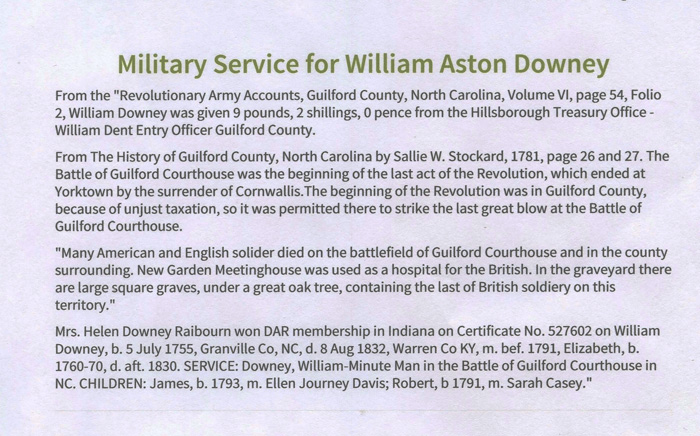My Great Grandfather, William Downey was a genius. You might wonder how I know? National Geographic Magazine defines a genius as someone that has a superior memory, that’s a problem solver and inventor and someone that writes short stories. My family recently did our genealogy and my Great Grandfather stands out as an exceptional person with those traits. Ok, this is how I know.
Not all geniuses are the same. They specialize in different endeavors, normally an avocation that they like. One of the first identifiable memory traits is remembering landmarks after completing a long trip. They remember the signs, buildings and all the other landmarks along the way. They keep that memory for a long period of time and they will know how long it will take to reach a destination if they have traveled that way before. That capability happens at about the age of ten years. I’m going to call this type of person a “structures genius”. I think William would have been an engineer or a computer programmer if he were alive today.
My Great Grandfather was a land surveyor by trade and he knew landmarks. A surveyor used poles and landmarks to develop new roads and record property deeds. He also explored the wilderness west of North Carolina all the way to Kentucky. Kentucky was the frontier at that time. He and Daniel Boone were keeping the trail hot between Kentucky and the more civilized North Carolina where William had family. The wilderness was being explored and people like William were creating new settlements. Our civilization was moving west. William made the maps and surveyed the land for those early pioneers. He had to fight the Indians and do his surveying at the same time. Daniel Boone lost his son to an Indian ambush. You had to be a warrior if you were going to travel though Indian country and keep your hair.
As a small businessman, William had to deal with the politicians of the day and they were part of the British Crown. His problems were many, but taxation without representation was the most difficult. After surveying a road for the Crown, William was paid for his services with a land grant. After transferring the land to William, the Crown levied a substantial tax on the land. Unfair taxation by the King of England caused the Revolutionary War. William volunteered as a Minuteman when he was in North Carolina. He was solving the problems of our country at an early age. A Minuteman is a volunteer that responds to a call to arms when needed. He identified the colonies’ problems and a solution to those problems. Another genius trait was his ability to do almost anything when needed. William was a successful wilderness surveyor in Kentucky when he was called to fight at the Battle of Guilford County Court House in North Carolina. Lt Col William Washington needed him to join his force of Light Dragoons. William and one hundred sixty members of the Light Dragoons fought a very experienced British Home Guard at that battle. The Guard using bayonets  had overwhelmed the Continental’s Second Maryland Regiment. The Dragoons on horseback charged the British four abreast down a narrow road with their swords swinging head high. They won the fight with the Home Guard and saved the Second Maryland. William changed professions almost as fast as his sword moved through the British Home Guard. This ability to do many things well is a characteristic of a “structures genius”
had overwhelmed the Continental’s Second Maryland Regiment. The Dragoons on horseback charged the British four abreast down a narrow road with their swords swinging head high. They won the fight with the Home Guard and saved the Second Maryland. William changed professions almost as fast as his sword moved through the British Home Guard. This ability to do many things well is a characteristic of a “structures genius”
After becoming a country, the United States offered all kinds of opportunity to its citizens. William had acquired several large tracts of land for his surveying services. Everyone wanted to pay surveyors in land grants. He was also paid a bounty for his participation in the Guilford County battle. You guessed right. It was a tract of land. Most of William’s family followed him to Kentucky. It was time to settle down and build a house. William’s house still stands and is lived in today. William changed professions again and became a farmer. The local frontier was disappearing and the next frontier was moving west. William purchased land and moved part of his family to Indiana. Plantation farming needed space between farms. It was a farming enterprise that was only one hundred miles from his Kentucky home. The Downey clan prospered in farming from that time until technology changed enough to spark new forms of family income.
William didn’t write that many short stories, but his legal writings on property transfers were extensive. National Geographic Magazine said that there is only one genius in four thousand people. Maybe their definition of a genius is in error. It could be that living a long happy life and not dieing during wartime is the true definition of a genius. Another genius from William’s time was George Washington. He was a surveyor, a warrior and a farmer. That sounds familiar doesn’t it?

 Click Image For The Sailboat Company's Home Page
Click Image For The Sailboat Company's Home Page